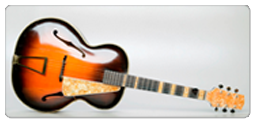Alf Binnie’s Guitar
May 1, 2013
In a German prisoner of war camp, you could use cigarettes to buy many things: a bar of soap cost 50 cigarettes; a chocolate bar, 200 cigarettes. Each time the Red Cross packages arrived at Stalag IX-C, Flying Officer Alf Binnie saved his cigarette rations for something special. He bought a guitar. He carried it with him from prison camp to prison camp, and often through blizzards.
At age 19, Alf Binnie left Montréal looking for adventure. He found it in the cockpit of a Wellington bomber, flying missions over Western Europe. But in March 1941, he was shot down over Holland. After receiving surgery for his wounded leg, he was sent to Stalag IX-C. It was there that he used cigarettes to persuade a prison guard to buy a guitar for him from a shop in nearby Weimar.
The bill of sale, dated February 5, 1942, notes the “Gitarre” cost 120,000 Reichsmarks. The Red Cross sometimes provided musical instruments to POWs, but this guitar was special, a copy of an archtop Gibson L series with very fine craftsmanship by an unknown luthier.
As a youth in Montréal, Alf had been a fan of Django Reinhardt, and may have brought gypsy jazz to the prison camp’s orchestra, the Stalagians, and a smaller combo known as The Four Bilge Boys. A program from April 1942 lists pieces such as Artie Shaw’s arrangement of Cole Porter’s “Night and Day.”
Alf managed to hold on to his prize possession while he was shipped from camp to camp, as far east as modern-day Lithuania. In the midst of a winter that helped destroy the Nazi army, he and 80,000 POWs were herded westward ahead of the advancing Soviet army, in a deadly trek known as “The Long March.” Alf managed to stay alive, and held on to his guitar.
He brought it back to Montréal. He married and opened a hotel in the Laurentians, where he entertained guests with his much-travelled guitar. Today, it is part of the Canadian War Museum’s collection and will be on display during the summer of 2013.